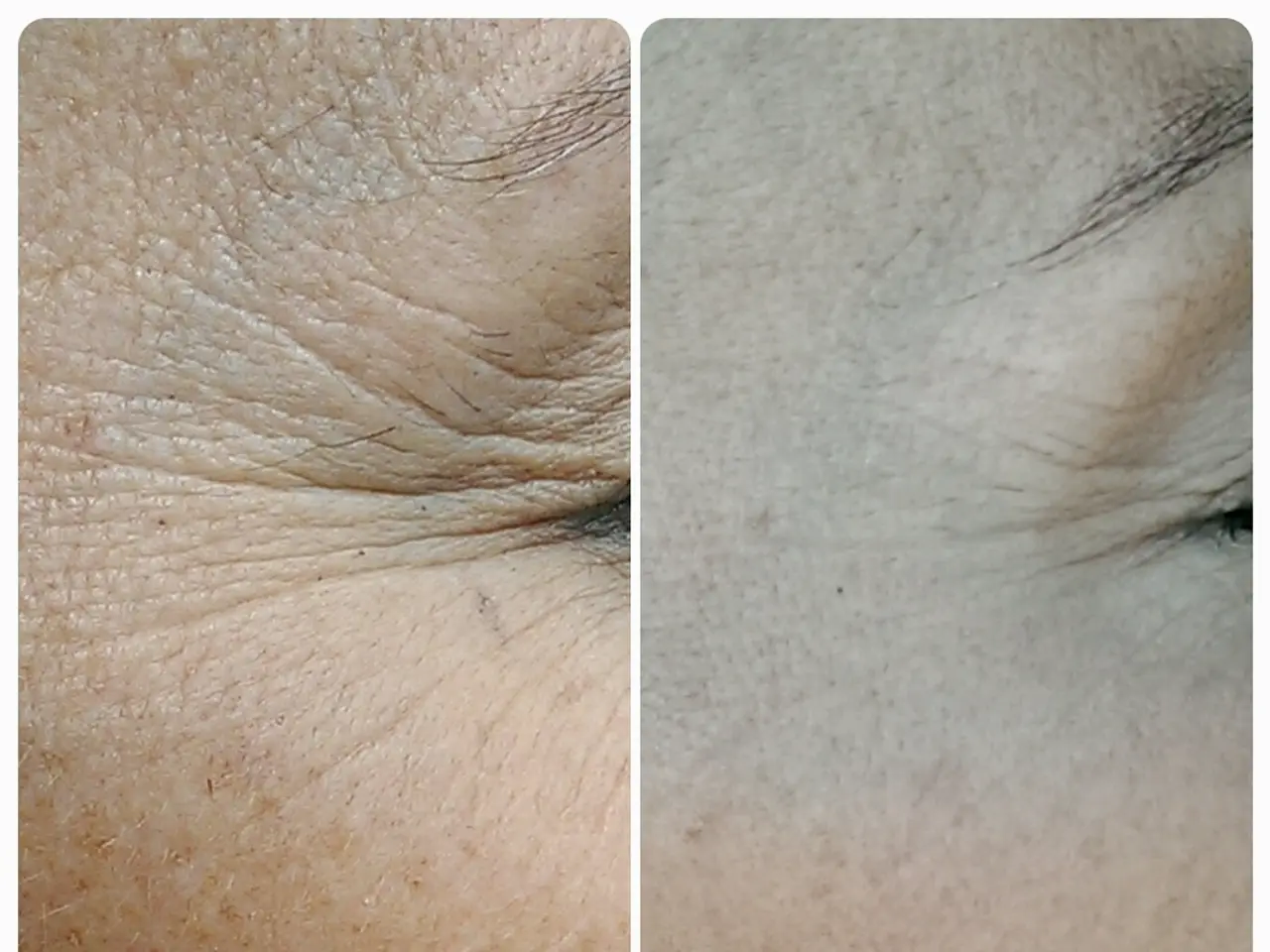Is it safe to apply moisturizers containing tretinoin?
In the world of skincare, treating acne and reducing the signs of aging can be a complex journey. One popular solution is Tretinoin, a topical medication derived from vitamin A. This article will provide an overview of using Tretinoin, its benefits, recommended practices, and precautions.
Tretinoin is a powerful retinoid that is used to treat acne and reduce the appearance of fine wrinkles, dark spots, and rough patches of skin. However, it's essential to approach its use with care, as Tretinoin can cause side effects such as dryness, blistering, swelling, changes in skin pigmentation, peeling, redness, and increased skin sensitivity to sunlight.
To minimize these side effects, it's recommended to use gentle, hydrating products alongside Tretinoin. Particularly ceramide-based moisturizers and mild cleansers can help strengthen the skin barrier and reduce irritation. Applying rich moisturizers for 2-4 weeks before starting Tretinoin can be beneficial.
When using Tretinoin, it's important to apply it once a day, in the evening, after allowing the skin to dry thoroughly for 20-30 minutes. Avoid physically exfoliating or combining Tretinoin directly with benzoyl peroxide or vitamin C serums at the same time, as these can increase sensitivity or irritation.
People with acne-prone skin may benefit from consulting with dermatologists to create effective skin care routines tailored to their individual needs. A healthcare professional can determine the best concentration of Tretinoin for an individual's skin.
Before starting Tretinoin treatment, individuals should cleanse the treatment area thoroughly and wait if they have used any of the prohibited skin products. It's also worth noting that Tretinoin is only available by prescription and is often more expensive than other retinoids like Adapalene.
Adapalene is another retinoid that can treat acne and can be applied during the day as it does not react as severely to sunlight. Trifarotene, another retinoid, is available in cream form and helps treat facial and body acne, having been found to reduce inflammatory lesions in studies.
However, Trifarotene is more expensive than Tretinoin and other retinoids. A less potent version of Tazarotene and Adapalene may cause fewer side effects than higher-strength products. Tazarotene, another retinoid, is used for treating acne and psoriasis, and a less potent version (0.045%) has been found to improve moderate to severe acne for many patients without causing serious side effects.
It's crucial to avoid combining Tretinoin with certain skin products such as those containing alcohol, lime, astringents, spices, harsh soaps, shampoos, sulfur, benzoyl peroxide, menthol, resorcinol, salicylic acid, hair coloring chemicals, and hair removal products, as these can lead to further skin irritation or damage.
Tretinoin is available in topical formulations such as lotion, gel, or cream. However, it should be avoided by people who are or are planning to become pregnant. Following a daily skin care routine, such as washing the face twice a day with a gentle cleanser, avoiding products that dry the skin, minimizing makeup use, and keeping hair away from the face, can help keep acne at bay.
In summary, building up skin tolerance by pre-treating with moisturizers, using a mild cleanser, incorporating calming antioxidants, and spacing active ingredients properly are the best strategies to minimize Tretinoin side effects. By following these guidelines and consulting with a healthcare professional, individuals can effectively use Tretinoin to improve their skin health.
Sources: - [2] https://www.harrisdermatology.com/naples-fort-myers-dermatology-services/tretinoin/ - [3] https://www.tiktok.com/discover/best-korean-products-to-pair-with-tretinoin - [4] https://us.typology.com/library/skincare-ingredients-not-to-mix - [5] https://www.artemedica.com/all-products/peel-bright-pads-5x-all-trans-retinol/ - [1] https://www.victoriandermalgroup.com.au/information-centre/how-to-use-ahas-bhas-and-retinol-in-your-daily-skincare-routine - [6] https://www.ncbi.nlm.nih.gov/pubmed/29964530 - [7] https://www.ncbi.nlm.nih.gov/pubmed/29910675 - [8] https://www.ncbi.nlm.nih.gov/pubmed/25965438 - [9] https://www.ncbi.nlm.nih.gov/pubmed/26327443 - [10] https://www.ncbi.nlm.nih.gov/pubmed/28355464
- Tretinoin, derived from vitamin A, is used to treat acne and reduce the signs of aging, such as fine wrinkles, dark spots, and rough patches of skin.
- Approaching Tretinoin use with care is essential, as it can cause side effects such as dryness, blistering, swelling, changes in skin pigmentation, peeling, redness, and increased skin sensitivity to sunlight.
- To minimize these side effects, gently hydrating products like ceramide-based moisturizers and mild cleansers can help strengthen the skin barrier and reduce irritation.
- It's recommended to apply rich moisturizers for 2-4 weeks before starting Tretinoin.
- Tretinoin should be applied once a day, in the evening, after allowing the skin to dry thoroughly for 20-30 minutes.
- Physically exfoliating or combining Tretinoin directly with benzoyl peroxide or vitamin C serums at the same time should be avoided, as these can increase sensitivity or irritation.
- People with acne-prone skin may benefit from consulting with dermatologists to create effective skin care routines tailored to their individual needs.
- Before starting Tretinoin treatment, the treatment area should be thoroughly cleaned, and one should wait if they have used any of the prohibited skin products.
- Tretinoin is only available by prescription and is often more expensive than other retinoids like Adapalene.
- Adapalene can treat acne and be applied during the day without reacting severely to sunlight.
- Trifarotene, another retinoid, is available in cream form and helps treat facial and body acne.
- Tazarotene, another retinoid, is used for treating acne and psoriasis, and a less potent version (0.045%) has been found to improve moderate to severe acne for many patients without causing serious side effects.
- Certain skin products, such as those containing alcohol, lime, astringents, spices, harsh soaps, shampoos, sulfur, benzoyl peroxide, menthol, resorcinol, salicylic acid, hair coloring chemicals, and hair removal products, should be avoided when using Tretinoin, as they can lead to further skin irritation or damage.
- following a daily skin care routine, such as washing the face twice a day with a gentle cleanser, avoiding products that dry the skin, minimizing makeup use, and keeping hair away from the face, can help keep acne at bay. This routine is especially important for those using Tretinoin.




